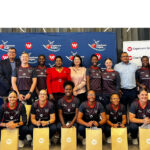IN CONVERSATION WITH TOSKA SEM
IWIB: Tell us about yourself – who is Ms. Toska Sem?
TS: In 2022, I assumed the position of Executive Director of the Namibia Civil Aviation Authority. Am a well-renowned professional with over twenty years of experience in the aviation industry, holding a Master’s in Business Administration from the University of Stellenbosch have served in various executive roles such as Executive Commercial in airport operations, airport manager, and organizational strategist. Additionally, I have contributed to several international aviation platforms, possesses a strong governance background, and currently serves on multiple boards in both the public and private sectors. Similarly, I serve the aviation sector in my capacity as the Vice President of the Southern Region on the African Civil Aviation Commission Bureau. Furthermore, am the Chairperson of the National Housing Enterprise. I am a passionate advocate for women and youth advancement.
IWIB: You are the Executive Director (ED) of the Namibia Civil Aviation Authority (NCAA). What does your job entail?
TS: The NCAA’s key role is to conduct the safety and security regulation of civil air operations in Namibia’s airspace and provide air navigation services to all users.
I work closely with stakeholders, including government entities and international aviation bodies, to advance Namibia’s aviation sector. It’s a position that requires a blend of technical expertise, leadership, and the ability to navigate complex industry challenges.
IWIB: Did you always know you wanted to be in aviation, or was it a winding journey?
TS: Like many people, I did not have a clear-cut career path from the start. My intrigue with aviation was more of a slow burn rather than an immediate passion. Throughout my life, I’ve always been drawn to leadership roles and challenges that push me to grow, which ultimately guided my trajectory toward the aviation industry.
My journey began in airport management, where I immersed myself in the operational intricacies of running an airport in a male dominant field. The environment was dynamic and multifaceted, offering opportunities to engage with various stakeholders, from airlines to government officials and passengers. This role taught me the importance of communication, collaboration, and the ability to adapt to rapidly changing situations. Every day brought new challenges, whether it was managing flight schedules, or enhancing passenger experiences. I quickly learned that resilience is key in this industry; the ability to stay calm under pressure while finding innovative solutions became one of my core strengths.
Through perseverance and a commitment to personal growth, I transitioned into more senior executive role, In that position, I oversaw significant projects that required strategic thinking and strong negotiation skills. I was fortunate to work alongside talented individuals who were equally passionate about advancing the aviation sector in Namibia. Together, we tackled challenges such as improving infrastructure, enhancing safety protocols, and fostering economic growth through increased connectivity. This brought the advent of Qatar Airways, KLM Airline and Ethiopian Airways on the Namibian soil.
Reflecting on my journey, I realize that the ‘wrong turns’ and unexpected detours have often taught me the most valuable lessons. Early in my career, I faced setbacks that, at the time, felt discouraging as my aviation skills were limited and the organizational culture was very weak by then. However, management ultimately pushed me to reevaluate my goals, seek mentorship, and seize new opportunities as they arose. This process of continuous learning and adaptation has been instrumental in my development as a leader in aviation.
IWIB: What is one lesson from your career that everyone should learn?
TS: I view challenges as opportunities for growth and encourage others to embrace a similar mindset. In this ever-evolving industry, the ability to pivot and respond to change is crucial. I’m proud of how far I’ve come and excited about the future of aviation, knowing that each experience, good or bad, has contributed to my journey.
Success requires persistence, adaptability, and a willingness to grow. Aviation is a demanding industry, but like any career, if you stay committed, continue learning, and embrace challenges, you will rise. Most importantly, leadership is not just about titles—it’s about impact and making a difference in someone live.
IWIB: Namibia has many successful women in business, but their journeys are not always easy. Did you face similar hardships?
TS: Absolutely, my roadmap has not been easy in society, working in a male dominated sector. Traditional gender roles dictated that men are seen as the primary leaders, while women are often expected to assume supportive roles. This cultural backdrop created significant barriers for me to excel in a leadership positions.
While women in leadership roles face significant challenges due to traditional gender culture, jealousy, and male resistance, fostering solidarity, inclusivity, and dialogue can help create a more empowered environment for all leaders. Addressing these issues is crucial for promoting gender equality and celebrating the contributions of women in business. Showcasing successful women leaders can inspire others and help change the narrative around women in leadership, demonstrating that we can succeed in traditionally male-dominated roles.
IWIB: Would you say these challenges are exclusive to women? Who is responsible for changing that?
TS: While many of the challenges faced in business and leadership are experienced disproportionately by women, they are not exclusive to them. Change requires a collective effort from organizations, governments, educational institutions, communities, individuals, and women ourselves. By fostering inclusive environments, advocating for equitable policies, and promoting collaboration across genders, society can work toward alleviating these challenges and creating a more equitable landscape for all.
IWIB: What challenges do you face daily as a woman in leadership, and how do you overcome them?
TS: While the challenges faced by women in leadership are diverse and complex, employing proactive strategies can help to overcome these obstacles. Creating Support Networks: Encouraging mentorship and collaboration among women can help mitigate jealousy and promote solidarity. Building strong networks is crucial for support and shared learning.
Promoting Inclusive Cultures: Organizations can work to foster inclusive environments that challenge gender norms and stereotypes. Training programs on unconscious bias can help raise awareness and promote change.
IWIB: How do you balance being a mother, wife, and professional? What have you sacrificed along the way?
TS: Finding balance as a mother, wife, and professional is an ongoing process that requires continuous adjustment and self-reflection. Each woman’s journey is unique, shaped by her individual circumstances, values, and support systems. While sacrifices may be needed along the way, I find ways to create fulfilling lives by prioritizing what matters most and leaning on support systems. Engaging in open communication with family members and colleagues can foster understanding and create a network of support that allows for more effective balancing of these roles. Ultimately, embracing the complexity of these responsibilities and accepting imperfections can lead to a more satisfying and authentic experience in both personal and professional life.
Balance is a constant effort. My family is my foundation, and while my career demands a lot, I ensure that I am present in the moments that matter. Sacrifices have certainly been made, both personally and professionally, but I have learned to be intentional about creating time for the things that bring me joy.
IWIB: Who are the three most influential people in your life, and how have they shaped you?
TS: Firstly, my parents are the most influential people in my life. They have instilled norms and values related to leadership that I continue to apply in my daily operations and personal career growth. They have shaped me into the person I am today, filled with self-awareness, self-confidence, and a strong foundation in believing in God. A life without a solid foundation is baseless.
Michelle Obama is one of the most influential people in my life for several reasons. First and foremost, her unwavering advocacy for education and girls’ empowerment resonates deeply with me. Her initiatives, such as ‘Let Girls Learn,’ remind me of the importance of access to education for all and inspire me to support similar causes.
Moreover, her role as a strong, authentic woman who broke barriers as the first African American First Lady serves as a powerful reminder of what can be achieved through hard work and resilience. She embodies the idea of staying true to oneself and embracing one’s identity, which motivates me to be confident in my own journey.
IWIB: If you could give your 18-year-old self-one piece of advice, what would it be?
TS: By giving this advice to your 18-year-old self, you’re encouraging a strong foundation for self-awareness, self-love, and confidence. Emphasizing these values can empower young individuals to navigate life’s complexities and embrace their uniqueness, ultimately leading to a more fulfilling and authentic life. Most importantly to cement the relationship with God who is our anchor and support in our day to day lives.
IWIB: What is something people often misunderstand about you?
TS: One thing that people often misunderstand about me is the way they perceive my confidence. I tend to come across as very conceited, with some even dubbing me “madam boss.” The reality, though, is that I am deeply passionate, and results driven.
I believe in taking initiative and leading with strength, which sometimes gets misinterpreted as being overbearing or self-important. I genuinely value collaboration and want to bring out the best in those around me.
People sometimes assume that being in leadership means you have all the answers. In reality, leadership is about continuous learning and collaboration. I surround myself with knowledgeable individuals, and together, we drive results.
IWIB: What is your favorite childhood memory?
TS: Spending time with my family, especially during Christmas. We hosted many visitors, and those big family gatherings are among my fondest memories. I love the warmth of family, storytelling, and shared traditions.
These moments not only highlights the importance of love and togetherness in my life but also opens the door for me to connect with friends and colleagues in my personal experiences.
These family gatherings weren’t just events; they were a foundation of love and connection that shaped who I am today. They taught me the value of family and have instilled in me the importance of nurturing relationships. I look back on those times with joy and gratitude.
IWIB: Where do you see yourself in the next 10 years?
TS: In the next 10 years, I envision myself as a dedicated mentor, deeply involved in empowering young girls to realize their potential and pursue their dreams.
Moreover, I look forward to celebrating their successes—attending graduations, witnessing them land their first jobs, and being there as they achieve milestones. Each success story will reinforce the importance of mentorship and our shared commitment to uplifting one another.
Advocacy will also play a crucial role in my future. I want to engage with organizations dedicated to girls’ education and empowerment while using my voice to raise awareness about the challenges they face. Sharing my journey through various platforms will be a way to inspire others and promote a wider dialogue on gender equality.
Ultimately, I aim to leave a lasting legacy of empowerment, making a meaningful impact in the lives of young girls and contributing to a future where they can thrive.”
IWIB: What does International Women’s Day mean to you?
TS: International Women’s Day represents a powerful blend of celebration, reflection, and action. It is a day to honour the incredible achievements of women throughout history and in our contemporary world—women who have shattered ceilings and paved the way for future generations in various fields.
At the same time, it serves as a vital reminder that we still face significant obstacles. Issues like the gender pay gap, violence against women, and lack of representation in leadership positions remind us that our work is far from over. This day inspires me to commit to advocacy and to supporting initiatives that promote gender equality.
It’s a celebration of progress and a reminder of the work that remains. Women have proven time and again that we are not just here because of gender but because of competence.
We must continue to uplift one another, ensuring that future generations inherit an even more inclusive world. As a prominent leader once said, “When you teach a woman to fish, you feed a nation.”
IWIB: Is there anything else you would like to share with our readers?
TS: Success is not just about personal achievement—it’s about the impact you make toward others. We need to keep pushing boundaries, opening doors for others, and setting new standards.
The aviation industry, like many others, is evolving, and I am excited to see what the future holds for Namibia’s young professionals.







